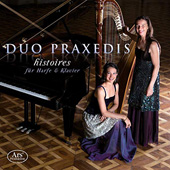
COLLECTIONS

Charles Oberthür (1819-1895): Duett über Themen aus "La Sonnambula" (Vincenzo Bellini)
Theodore Labarre (1805-1870): Caprice on "La Favorite" Op. 111 (Gaetano Donizetti)
Henry Steil (1787-1851): Terzetto "Zitti, zitti, piano, piano" from "Il Barbiere di Siviglia" (Gioachino Rossini)
Sophie-Lucille Larmande des Argus (1820-1835): Fantaisie sur des motifs du "Siège de Corinthe" (Gioachino Rossini)
Theodore Labarre: Duo su temi della "La gazza ladra" (Gioachino Rossini)
François-Joseph Naderman (1781-1835): Variationen über Themen aus "Figaros Hochzeit" (Wolfgang Amadeus Mozart)
Benedetto Negri (1784-1854): Réminiscences aus "La gazza ladra" (Gioachino Rossini)
Sophie-Lucile Larmande des Argus: Duo concertant de l’opera "Emma" (Giacomo Meyerbeer)
Charles Oberthür: Various themes on "La Favorite" (Gaetano Donizetti)
Sophie-Lucile Larmande des Argus: Fantaisie sur des motifs de "Marie" (Ferdinand Hérold)
Robert-Nicolas-Charles Bochsa (1789-1856): Ouverture aus "Il Barbiere di Siviglia" (Gioachino Rossini)
This week my attention was diverted to a new recording on the German label Ars Produktion featuring Duo Praxedis, a Swiss mother and daughter harp and piano duo who have been performing and recording together, on various labels, for over 20 years. Previous recordings showcase the music of Brahms, Wegmann, Rütti, Tchaikovsky, Boieldieu, Gottschalk, to name but a few. This recording titled Histoires groups together arrangements by obscure composers, of famous opera arias and overtures. Because they've been playing together for so long, Praxedis Hug-Rütti (harp) and Praxedis Geneviève Hug (piano) complement each other's playing without fault. One might think that the combination of harp and piano would sound odd but in fact, when playing in unison, the harp softens the piano's brightness and lends to it a bell like quality, and in turn, the piano reinforces the harp's delicate tone.
The dynamic balance between the two instruments is always finely calibrated so that when the harp takes on the leading role its clearly heard, and vice-versa. And they exchange that role many times within Rossini's overture to the Barber of Seville, and in doing so never allow the fun and frivolities to falter. Each and every piece is given the required level of drama, levity, and operatic cantabile it calls for. So if you enjoy opera, the sound of the harp and the piano, this triple combination should provide an evening of fine entertainment at the opera.
Jean-Yves Duperron - October 2018